New Approaches to Classics (formerly Myth and Religion) is the departmental lecture series of the Boston University Department of Classical Studies. Typically there are two or three lectures in each semester by invited speakers from the US and abroad. Since 2022, the lecture series has been particularly focused on showcasing the work of junior scholars and scholars from diverse backgrounds; work that connects the ancient world to contemporary issues and concerns; and work that challenges the boundaries of what ‘Classics’ can and should mean today. Beginning in Spring 2023, one speaker per year is determined by the vote of the graduate students. All lectures are free and open for anyone to attend.
The New Approaches to Classics lecture series is generously funded by a grant from the Boston University Center for the Humanities.
For more information, contact Prof. Steven Smith (sds74@bu.edu) or Senior Program Coordinator Joe Knapik (classics@bu.edu).
Presenters for 2025-2026 include:
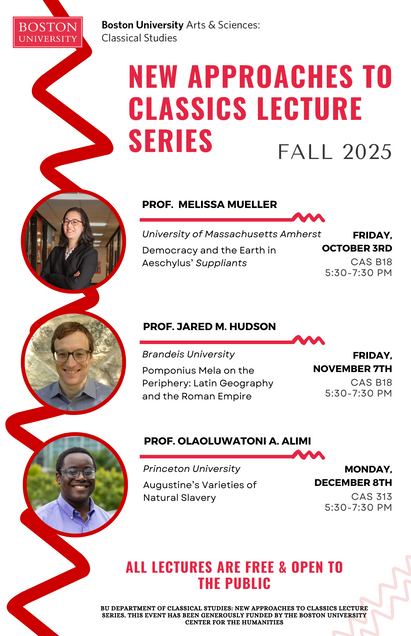
Professor Melissa Mueller (University of Massachusetts Amherst)
Friday, October 3, 2025. 5:30-7:30pm
CAS B18, 725 Commonwealth Ave
Title: Democracy and the Earth in Aeschylus’ Suppliants
Description: In offering asylum to the Danaid chorus in Aeschylus’ Suppliants, the Argives exercise their public decision-making power, a cornerstone of democratic ideology. But democracy requires more than the will of the people. In this talk I explore both the form of this tragedy, with its extended parodos, and the autochthony myths that are reactivated around the Danaids’ appeal for protection, and I argue that the grant of metic status in Argos to the women speaks to the interdependence, vital to democracy both ancient and modern, between the land (earth as environment) and the polis. The Danaids’ presence in Argos, I suggest, not only reminds the male citizens of their earthly origins and democratic commitments, but also prompts the earth’s intervention, activating collective memories of the exile of their bovine ancestor, Io.
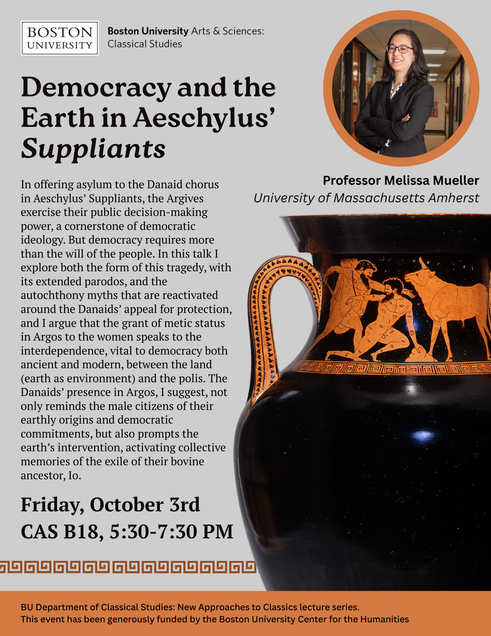
Professor Jared M. Hudson (Brandeis University)
Friday, November 7, 2025. 5:30-7:30pm
CAS B18, 725 Commonwealth Ave
Title: Pomponius Mela on The Periphery: Latin Geography and the Roman Empire
Description: Pomponius Mela’s first-century CE geography (De Chorographia) offers a unique portrait of what purports to be the entire world articulated in highly artistic rhetorical Latin prose. Once a central text in antiquity and beyond, this detailed geographical handbook has since become practically forgotten. Tracing some of the historical causes for this neglect, this paper examines some of the distinctive features of this fascinating and unclassifiable text, arguing that Pomponius Mela’s written geography represents an important cultural shift in unofficial Roman representations of the layout and knowability of global space.

Professor Olaoluwatoni A. Alimi (Princeton University)
Monday, December 8, 2025. 5:30-7:30pm
CAS B313, 725 Commonwealth Ave
Or Join us On Zoom Here! https://bostonu.zoom.us/meeting/register/zW5QpAXuRIOWOY3Hsr4UMA
Title: Augustine’s Varieties of Natural Slavery
Description: Augustine is typically interpreted as having denied that there are natural slaves. Against the common interpretation, I argue that Augustine affirmed three separate natural slavery theses (and rejected only one). Aspects of Augustine’s accounts of natural slavery were central to 17th-century English rationalizations for slavery. However, they also left open several lacunae that these pro-slavers turned to Aristotle to fill. The methods for filling these lacunae were in turn central to the legal codification of some modern notions of race, including three familiar features: first, that race is immutable; second, that race is inheritable; third, that blacks are deficient to whites.
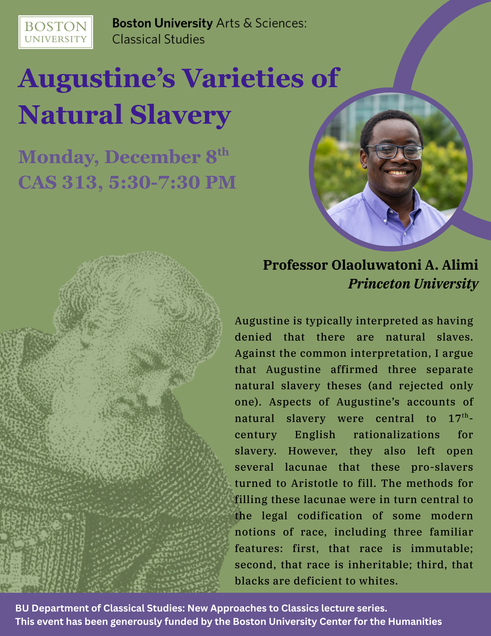
Presenters for 2024-2025 include:
Professor Anthony Corbeill (University of Virginia)
Monday, March 24, 2025. 5:30-7:00pm
CAS B18, 725 Commonwealth Ave
Title: Communicating on Rome’s Edges: Tongues, Gestures, and Art
Description: How did Romans communicate along the expanding edges of empire-on the verbal, physical and visual levels-when Latin was unavailable? The lecture will treat four different periods and locations;
- Interactions between Etruscan and Roman culture in the early to middle Republic
- Modes of contact during the late Republic and early empires, in particular between Julius Caesar and the Gauls
- Monumental inscriptions from the imperial period erected in the eastern reaches out of the empire
- Gestural communication and artistic exchange during late antiquity that arises from commercial activity beyond the eastern most portions of Rome’s expanse

Professor Victoria Wohl (University of Toronto)
Tuesday, November 12, 2024. 5:30-7:30pm
CAS 313, 725 Commonwealth Ave
Title: Of Pigs and The Proper: Philosophy and The Other in Plutarch’s Gryllus
Description: Plutarch’s Gryllus (“Grunter”) stages a dialogue between Odysseus and one of his men who was turned into a pig by Circe about whether animals are more virtuous than humans. This humorous treatise raises serious questions about the place of the other in philosophy: must philosophy exclude the other in order to constitute the proper domain of reason (logos) or does it require the other for its practice of intellectual inquiry (dialogos)? This paper examines how the treatise thinks through these questions and the implications for Plutarch’s philosophy.
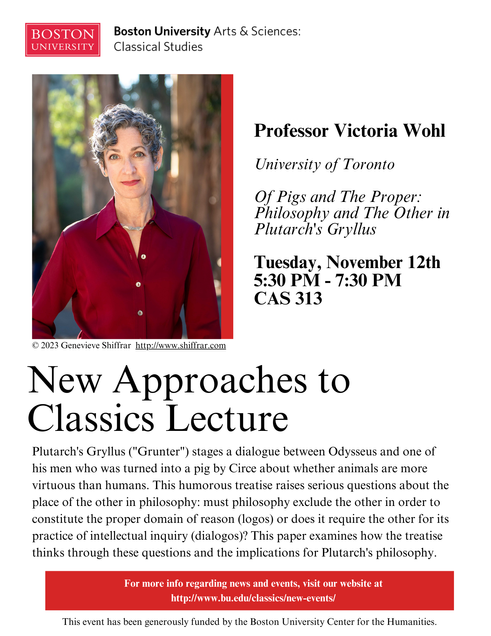
Professor Mark Thatcher (Boston College)
Monday, October 21, 2024. 5:00-7:30pm
CAS 224, 725 Commonwealth Ave
Title: When the Athenians Came: Rethinking the Sicilian Expedition
Description: The Sicilian Expedition, one of the most famous events in Greek history, has usually been understood from an Athenian perspective, as a disaster of epic proportions. What if we flipped the script and instead foregrounded Sicilian perspectives? Drawing on a wider range of sources and digging deeper into the Sicilian background and context of this period can help us rethink the expedition’s origins and its place in history.

Professor Lauren Donovan Ginsberg (Duke University)
Tuesday, October 1, 2024. 5:00-7:30pm
CAS 313, 725 Commonwealth Ave
Title: Lament for Oechalia: Pastoral’s Imperialist Complicity in the Hercules Oetaeus
Description: The anonymous imperial tragedy, Hercules Oetaeus, opens with a bombastic Hercules asserting his right to divinity because of his imperial project of monster killing and world pacification. But directly next comes an unprecedented choral ode by the women who recently experienced this peace-making: the women of Oechalia. As these women look for a final time at their wasted homeland, they sing an angry lament about their country’s future. This lament, I argue, is markedly engaged with the Roman pastoral mode and, through this engagement, presents the pastoral genre as complicit in Hercules’ imperialist violence.
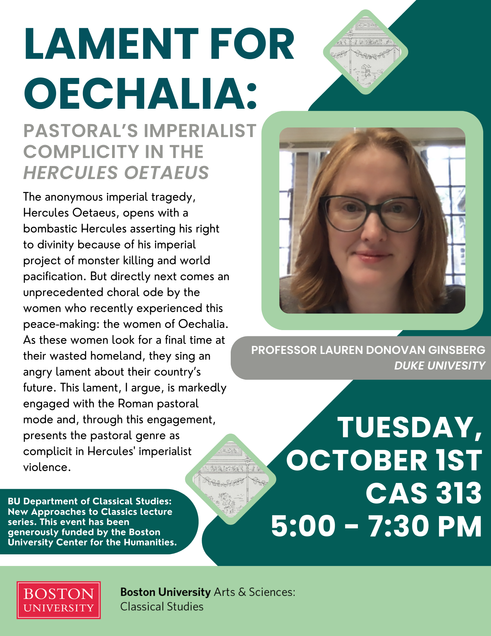
Presenters for 2023-2024 include:
Professor Stephen Hinds (University of Washington)
Friday, March 1, 2024. 5:00-6:30pm
CAS B36, 725 Commonwealth Ave
Title: Latin poetry across languages: micro-negotiating classical tradition, with Joachim Du Bellay and John Milton
Description: A try-out of material from my soon-to-be-completed Latin Poetry across Languages: Adventures in Allusion, Translation and Classical Tradition (working title), framed with remarks on the book’s era-straddling plan. I will lead off with some observations about the poetic interaction of Latin and Greek in the ancient Roman world (from Part I of my book), focusing on paradoxical elements in that much-studied relationship. Then, moving forward in time, I will sample two early modern case studies from Part II, ‘Readings between Latin and vernacular’: (a) ‘Du Bellay in Rome, between Latin and French’ (drawing on that poet’s French Antiquitez de Rome and his Latin elegy Romae descriptio, both from the 1550s), and (b), more briefly, ‘Reverse-engineering Milton’ (in which, against the background of Milton’s 1645 double book of Poems English and Latin, I conjure up a virtual Latin ‘twin’ for the great epic which Milton did not write in Latin, Paradise Lost. Poetic conversations throughout will be driven by close engagement across space and time with (especially) Horace, Ovid and Virgil.

Professor Victoria Pagan (University of Florida)
Thursday, October 5, 2023. 5:00-6:30pm
STH B19, 745 Commonwealth Ave
Title: Sallust and the Open Society
Description: When read through the lens of Karl Popper’s The Open Society and its Enemies, Sallust’s Bellum Catilinae becomes a unified meditation on the nature of change, the conditions of leadership, and ultimately the difference between tyranny and democracy. But of course, it is also the prototype of conspiracy narratives in Roman literature, and Popper’s formulation of the “conspiracy theory of society” sheds light on both the form and the content of Sallust’s monograph.
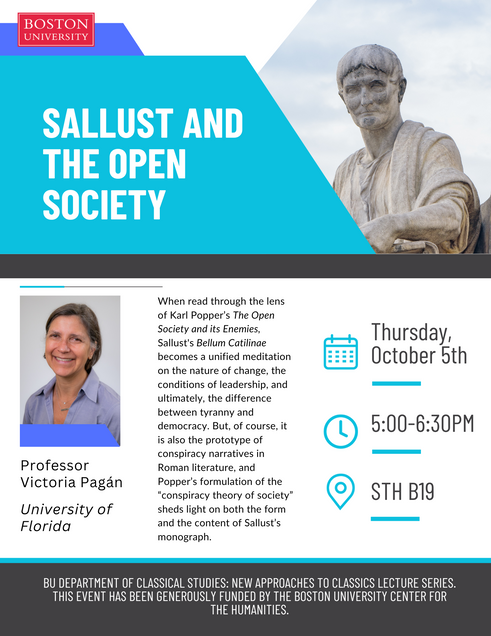
Professor Katherine Lu Hsu (College of the Holy Cross)
Monday, October 30, 2023. 4:45-6:15pm
CAS B36, 725 Commonwealth Ave.
Title: Meet Me Outside: Mythological Courage and Cowardice Beyond the Hero
Description: This talk will examine the representation of courage and cowardice beyond the paradigmatic hero in early Greek myth. We will look at examples of courage on the battlefield among foreigners and women, and consider why non-elites seem to be excluded from the kleos economy. This study reveals some of the “hard lines” that limit the mythological imagination, suggesting an enduring anxiety about internal stasis.

Professor Niek Janssen (Amherst College)
Wednesday, November 15, 2023. 4:45-6:15pm
CAS B18, 725 Commonwealth Ave.
Title: Making Fit: Parody and Decorum in Greco-Roman Literature
Description: The concepts of decorum and to prepon pervade Greco-Roman ethical and aesthetic thought. Yet ancient theorists from Plato to Dionysius, Cicero, Horace, and Quintilian struggle to articulate what “appropriateness” is and how it is grounded. By confronting these theorists with parodic and comedic texts, which stand in a double, transgressive-yet-conservative relationship to decorum, I argue that this inarticulability is a feature, not a bug, of the concept. Texts like Hegemon’s Parodies, Plautus’ Asinaria, and the Pseudo-Virgilian Culex reveal the instability of decorum as a basis for normative thought–as a principle for aesthetic judgment and social inclusion/exclusion.
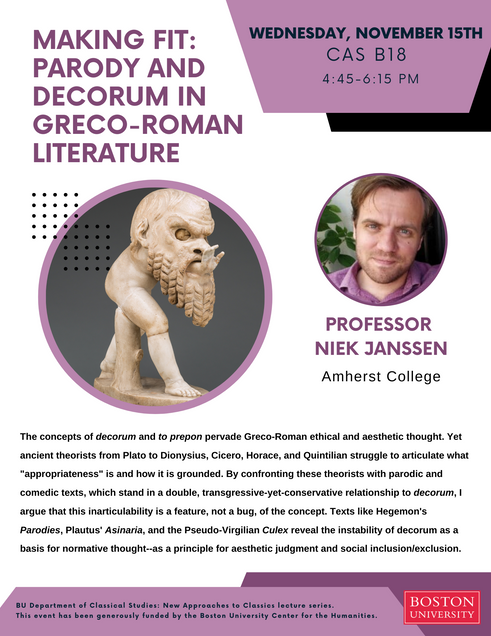
Presenters for 2022-2023 include:
Jenny Clay (University of Virginia)
Tuesday, April 11, 2023. 5:30-7:00pm
CAS 132, 725 Commonwealth Ave.
Topic: Last Tango in Ogygia: Gods and Men in Odyssey 5
Laurie Hutcheson (Boston University)
Monday, January 30, 2023. 3:30-5:30pm
CAS 533B, 725 Commonwealth Ave.
Topic: Penelope’s {A}typical Thinking
Abstract: Penelope’s thought process—in contrast to male heroes’–has been described in turn as intuitive, irrational, inaccessible, and unresolved. The Odyssey represents Penelope deliberating 4 times, more than any other character except Odysseus. I argue that the typical scene of deliberation in the Odyssey is tightly coordinated and differs from the Iliadic model, and that Penelope’s deliberations need to be read in light of this. In particular, Penelope’s choice in book 19 resonates both within this context of Odyssean deliberation and within the Iliadic context of heroic soliloquys; she both aligns with and inverts typical heroic patterns. While she makes decisions amid deep instability, Penelope’s thoughts are articulated clearly and legibly in the reverberative frame of Homeric representations of thought.
Timothy Clark (Boston University)
Thursday, October 6, 2022. 5:30 – 7:00pm
JSC 201, 147 Bay State Rd.
Topic: From Roman Geopolitics to American Law: How Classics Can Illuminate Historical Experiences and Structures of Racism and Othering
Abstract: In recent years, events at home and abroad have demonstrated the urgent need to highlight and uproot structures of racism and inequality that dominate American life. Academic complicity in these structures has also come under increased scrutiny. Scholars within Classics and ancient history have used new methodologies to expand our views of ancient societies and render the ancient world relevant to the 21st century.
In support of these efforts, Professor Timothy Clark will show in this lecture how comparing the ancient and modern worlds sheds new light on the conceptual frameworks that underpin racism and othering. Professor Clark will show how Roman officials under the emperor Nero and the American legal system in the 21st century situated eastern “others” in conceptual and legal positions where their exact status was left ambiguous. He will explain why this form of Orientalism persists and how it personally impacted ancient eastern nobles and modern Iranian-Americans alike. This lecture will show the dangerous consequences that result when the categories we create for different ethnic and racial groups are taken for granted.
Kristina Chew (Rutgers University)
Tuesday, October 18, 2022. 5:00 – 6:30pm.
STH B23, 745 Commonwealth Avenue.
Topic: Translating Catullus and Catullus Translating
Presenters for 2021-2022 include:
Patrick Finglass (University of Bristol)
Friday, March 18, 2022. 4:30-6:15pm
CAS B18, 685-725 Commonwealth Ave.
Topic: Euripides’ Danaë and Dictys: a new papyrus
Abstract: P.Oxy. 5283, originally from a second-century papyrus roll, contains ancient prose summaries (‘hypotheses’) of five tragedies by the classical Greek dramatist Euripides, including of two lost plays depicting the hero Perseus, Danaë and Dictys, previously known only from meagre fragments. Since its publication in 2017, however, it has been overlooked by scholarship. This paper examines the light which the papyrus sheds on Danaë and Dictys, whose narratives, centred around ultimately successful female resistance to abusive male tyrants, speak as powerfully to us today as they did to their original ancient audiences. It proceeds to investigate Euripides’ tragic trilogy of 431 BC, which ended with Dictys and began with what today is probably Euripides’ most famous play, Medea, whose brilliance now stands in sharper focus given our significantly improved understanding of the context in which it originally appeared. Building on this analysis, the paper further considers what impact this papyrus has on our picture of the tragic trilogy more generally, demonstrating the range of approaches taken by tragic poets to this inherited literary form. Finally, it ponders the purposes which such a document served in the Roman empire, and why readers in the second century AD should have wanted a summary of plays written more than half a millennium before.
Sarah Spence (University of Georgia)
Tuesday, February 8, 2022, 4:30-6:15pm
CAS 116, 685-725 Commonwealth Ave.
Topic: “Reading Against the Grain: The Cultural Poetics of Roman Sicily”
Caitlin Gillespie (Brandeis University)
Monday, November 8, 2021, 4:30-6:15pm
CAS B18, 685-725 Commonwealth Ave.
Topic: “The Mind, Once Manly, Now Effeminate: Gender and the Failure of Language in Sallust”
Kendra Eshleman (Boston College)
Monday, October 18, 2021, 4:30-6:15pm
CAS B18, 685-725 Commonwealth Ave.
Topic: “Unlettered in Paradise: Non-Readers in Early Christian Reading Culture”
Presenters for 2020-2021 include:
Matthew Christ (Indiana University)
Monday, March 15, 2021, 4-6pm
via Zoom
Register Here!
Topic: Discussion of Chapter 6 (~ Anabasis) of his new book on Xenophon and the Athenian Democracy: The Education of an Elite Citizenry”
Simone Beta (Università di Siena)
Monday, February 22, 2021, 4-6pm
via Zoom
Register Here!
Topic: “Lysistrata’s voices: ten ways to translate an Aristophanic comedy”
Seth Schein (University of California at Davis)
Friday, November 13, 2020 4pm-6pm
via Zoom
“Green and Yellow Commentary on Iliad 1.188-253″
Presenters for 2019-2020 include:
CANCELLED
Matt Christ (Indiana University)
Thursday, April 9, 2020
School of Theology Rm. 409
CANCELLED
John Schafer (Wake Forest University)
Friday, March 20th 4pm-6pm
School of Theology Rm. 409
“Catullus Through His Books”
George Baroud (Emerson College)
Friday, February 21st, 4pm-6pm
School of Theology Rm. 409
“Tacitus’ Annals and the Aesthetics of History”
Nykki Nowbahar (Rutgers University)
Monday, November 18th, 4pm-6pm
School of Theology Rm. 409
“Quae Fugit a Sexu’: Understanding Gender though Female Transvestism in Roman Literature”
Sarah Derbew (Harvard Society of Fellows)
Wednesday, November 13, 4pm-6pm
School of Theology Rm. 409
“Sun-kissed Greeks: Theorization of Blackness in Ancient Greek Literature”
Yujhán Claros (Columbia University)
Monday, November 4th, 4pm-6pm
School of Theology Rm. 409
“Classical Coloniality; Marginality, Subalternisms, and Gender Trouble in the Hellenized Imperial Poetry of Alexandria and Rome”
Mark Janse (University of Ghent)
Wednesday, October 23, 4pm-6pm
School of Theology Rm. 409
“More Maculate Musings: New Wordplays in Aristophanes’ Lysistrata”
Presenters for 2018-2019 include:
Nancy Rabinowitz (Hamilton College)
Wednesday, March 27, 3pm-5pm
School of Theology Rm. 409
“Gender and Sexuality: Lenses on the House of Atreus.”
Nicole Julia Giannella (Cornell University)
Monday, February 25, 4pm-6pm
School of Theology Rm. 409
“Who Ululates at the Temple of Bacchus? Inequality Before the Law in the Roman Empire”
Maria Youni (Thessaloniki and Institute for Advanced Study)
Monday, February 11, 4pm-6pm
School of Theology Rm. 409
“Donation to the Goddess: Worship, Law and Economy at the Sanctuaries of Roman Macedonia”
Nina Papathanasopoulou (Connecticut College)
Wednesday, November 28, 5pm-7pm
School of Theology Rm. 409
“Serpent Heart: Animality, Jealousy, and Transgression in Martha Graham’s Medea (Cave of the Heart)”
Martin Revermann (University of Toronto)
Thursday, October 4, 4pm-6pm
School of Theology Rm. 409
“Translation Prefaces”
Presenters for 2017-2018 include:
Dee Clayman (The City University of New York)
Monday, April 30, 4pm-6pm
School of Theology Rm. 409
“Astral Politics: Royal Catasterisms in Callimachus and Aratus”
Marco Formisano (Ghent University)
Monday, April 9, 4pm-6pm
School of Theology Rm. 409
“Seeing Double: The Contemporary and the Immemorial in Claudian and Colluthus”
Roberta Stewart (Dartmouth College)
Monday, March 12, 4pm-6pm
School of Theology Rm. 409
“Seeing Caesar’s Symbols: Religious Iconography on Caesar’s Civil War Coins”
Dr. Emily Hauser (Society of Fellows, Harvard University)
Monday, February 26, 4pm-6pm
School of Theology Rm. 409
“Women’s Myths, Women’s Voices: Recovering the Women of Greek Myth in Contemporary Fiction”
Gareth Williams (Columbia University)
Monday, November 13, 4pm-6pm
School of Theology Rm. 625
“Eschatology in Seneca: The Senses of an Ending”
What happens to us in death? Seneca, like many philosophical thinkers before him, reflected hard on what awaits us after we depart, and this talk seeks to illuminate some of the creative ways in which he broaches this time-honored topic.
Sponsored by the Boston University Center for the Humanities, the Study Group on Myth and Religion in the Ancient World, and the Boston University Department of Classical Studies.
Zacharoula Petraki (University of Crete)
Wednesday, November 8, 4pm-6pm
School of Theology Rm. 409
“The Heroization of Socrates in Plato’s Phaedo and of Oedipus in Sophocles’ Oedipus at Colonus.”
Sponsored by the Boston University Center for the Humanities, the Study Group on Myth and Religion in the Ancient World, and the Boston University Department of Classical Studies.
Daniel Selden (University of California, Santa Cruz)
Friday, November 3, *4pm-6pm
School of Theology Rm. 625
“Guardians of Chaos: The Coptic Alexander Romance”
Sponsored by the Boston University Center for the Humanities, the Study Group on Myth and Religion in the Ancient World, the Boston University Department of Classical Studies, and the Boston University Department of World Languages and Literature.
Presenters for 2016-2017 include:
David Ferry
Monday, April 3
Reading from his forthcoming translation of Virgil’s Aeneid (University of Chicago Press, 2017)
Sponsored by Boston University Classics, The Study Group on Myth and Religion in the Ancient World, and BUCH
David Ferry is an acclaimed poet and translator. He is the recipient of the National Book Award for Poetry (Bewilderment: New Poems and Translations, 2012), a fellow of the American Academy of Arts & Sciences and of the American Academy of Poets, and is the Sophie Chantal Hart Professor Emeritus of English at Wellesley College. Ferry’s admired translations include verse renderings of Gilgamesh, The Odes of Horace, and The Eclogues.
Thomas G. Palaima
Monday, February 27
“Personal Agency and the Big Switch 1962-64: Thucydides, Bob Dylan and Stanley Kubrick.”
Sponsored by Boston University Classics, The Study Group on Myth and Religion in the Ancient World, BUCH, and Arion
Palaima is a MacArthur Fellow (1985-1990), and the Robert M. Armstrong Centennial Professor of Classics and Director of the Program in Aegean Scripts and Prehistory at the University of Texas at Austin. For 25 years he has taught seminars on the human response to experiences of war and violence. This semester he is teaching ‘Bob Dylan’s Social-Historical Imagination’ at UT Austin.
Presenters for 2015-2016 include:
Colin Wells
Wednesday, April 27, *5-7pm
School of Theology Rm. 625
Classics Is Dead. Long Live Classics!
How the New Classics Will Totally Rule Without Worrying About the “Greatness” or “Genius” of the Greeks or Anyone Else
Benjamin Altschuler (Harvard University; Center for the Study of Ancient Documents at Oxford University; Field Director of the Institute for Digital Archaeology)
Wednesday, March 2
School of Theology Rm. 625
“Cultural Heritage in Crisis: Digital Solutions for a Modern World”
Summary: Using digital technology to preserve archaeological artifacts and cultural legacy, Ben and his team have been called “The New Monuments Men” by Newsweek and at least 3,000 other articles to date.
Professor Peter Davis (University of Adelaide, Australia)
Wednesday, October 7
“Free Speech in Virgil and Ovid”
Sponsored by the Peter Paul Career Development Professorship
Dr. Frederick Baker (Cambridge University)
Friday, September 18
School of Theology Rm. 625
“Pitoti. Digital Humanities at the Barbarian Rock-face: Proto-cinema and tribal modernism in the classical art of the ancient Alps”
Summary: Dr. Frederick Baker of Cambridge University will present on his Pitoti project, Paleolithic rock carvings that he and his colleagues have studied with cameras under different lighting conditions. At different times of the day, they discovered that the carved figures are not static at all. Instead they seem to “move” and tell astonishing narratives. Dr. Baker is a senior researcher at the McDonald Institute for Archaeological Research at Cambridge.
Related Event: BU Cinema and Media Studies and the BU Film Society will present a screening of Frederick Baker’s SHADOWING THE THIRD MAN, a documentary, with a Q&A session afterward. Please join us in CAS B36 at 7:00 p.m.
Presenters for 2014-2015 include:
Professor Mary Yossi (National and Kapodistrian University of Athens).
Thursday, March 5
‘”Human Rights” and Greek Tragedy”‘
Also sponsored by the Onassis Foundation
Ilaria Ramelli (Sacred Heart Major Seminary/Erfurt University)
Monday, March 2
“The Role of Asceticism in the Rejection of Slavery and Social Injustice in Ancient Philosophy, Ancient Judaism, and Early Christianity”
Also sponsored by the Onassis Foundation
Summary: Were slavery and social injustice leading to dire poverty in antiquity and late antiquity only regarded as normal, “natural” (Aristotle), or at best something morally “indifferent” (the Stoics), or, in the Christian milieu, a sad but inevitable consequence of the Fall, or even an expression of God’s unquestionable will (Augustine)? The lecture will show that there were also definitive condemnations of slavery and social injustice as iniquitous and even impious, and that these came especially from ascetics. It will be argued that this depends on a link not only between asceticism and renunciation, but also between (philosophical) asceticism and justice.
Lynn Huber (Elon University, NC)
Monday, February 23
“Revealing and Rejecting Imperial Family Values: Revelation as Social Critique”
Summary: Sitting at the edge of the Christian canon the Book of Revelation has puzzled readers for centuries. Even early interpreters wondered whether it should be called a “revelation” given its otherworldly imagery and puzzling pronouncements. Understood within the tradition of Jewish apocalyptic writing and in relation to its first-century Roman context, Revelation can be understood as an “unveiling” of what John, the author, believes to be the corrupt, even evil, nature of Roman power. However, in calling his audience to resist the “whorish” appeal of Rome, John engages and even replicates the dominant social discourses of his day.
Athina Papachrysostomou (University of Patras)
December 8, 2014
“Comic Money: The Case of Hetairai and Fishmongers”
Alessandro Barchiesi (Stanford)
October 23, 2014
“The War for Italia in Vergil’s Aeneid”
Presenters for 2013-2014 include:
Mary Lefkowitz (Wellesley College)
March 21, 2014
“Piety and Impiety in Euripides’ Heracles.”
Nicolas Prevelakis (Harvard University)
November 12, 2013
“The role of the Ancients in contemporary Greece, in light of the current crisis”
Hanna Roisman (Colby University)
October 21, 2013
“Setting and Sense in Sophocles’ and Euripedes’ Electra”
Peter Rhodes (Durham University)
September 24, 2013
“Directions in the Study of Athenian Democracy.”
Presenters for 2012-2013 include:
Stephen Kidd (Brown University)
April 3, 2013
“How (not) to take mockery seriously: the case of Cinesias.”
Can we take ancient Greek comedy seriously? An old, contentious question, but in this talk with a new angle: what exactly does this interpretive process called “taking seriously” actually mean? Following the beloved komodoumenos / dithyrambic poet Cinesias (and his appearances in Aristophanes and the comic fragments), I will ask how, in Greek terms, Cinesias would have been able not to “take” comic mockery “seriously,” and offer a new picture of this peculiar hermeneutic habit.
Jay Reed (Brown University)
November 30, 2012
“Alexandria and the Aeneid.”
A discussion – with a combined reading – of the Aeneid‘s appropriation of Hellenistic ideas about kingship, especially from Ptolemaic poetry.
Stephen Halliwell (University of St. Andrews)
November 8, 2012 (* to begin at 5:30 pm in STH 625)
“Greek Gods and the Archaic Aesthetics of Life.”
This will be the second part of a two-part lecture and seminar event. The lecture (part of the Institute for Philosophy and Religion’s 2012-2013 Lecture Series) will be held on Wednesday, Nov. 7 at 5 pm at the BU School of Law Barristers Hall (765 Comm. Ave., first Floor). Commentator: Charles Griswold (BU). The Myth and Religion seminar will be a discussion of passages in Greek (with translations also available) related to Halliwell’s general talk the night before.
Gregory Bonnin (Université de Bordeaux)
October 31, 2012 (* to begin at 12:00 pm)
“Is the Athenian Empire controlling the Market? Megare and Melos in the heart of Athenian economic ambitions.”
Presenters for 2011-2012 include:
Christopher Krebs (Harvard University)
March 2, 2012
“Tacitus’ Germania. A short history of a most dangerous book.”
Tacitus’ Germania was admired through centuries as “a golden booklet,” “an admirable work,” and “an immortal text.” But in the second half of the 20th century, Arnaldo Momigliano, an erudite authority on the history of ideas, gave it high priority among “the one hundred most dangerous books ever written.” In this talk, Christopher Krebs will trace the history of Tacitus’ ethnography, showing how a golden booklet ultimately became dangerous.
Andrew Lear (New York University)
December 9, 2011
“Images of Ancient Greek Pederasty: The way Greek artists portrayed their culture’s homoerotic customs”
Pederasty – erotic relations between adult men and adolescent boys – was a central characteristic of ancient Greek culture. It is an important theme in Greek literature, from poetry to comedy to philosophy – and in Greek art as well. One of the best sources of information about this custom is Athenian vase-painting – the painted scenes that decorate clay drinking vessels produced in Athens between the 6th and the 4th centuries BC. In this talk, Professor Lear will examine the way vase-painters portrayed pederasty and what this tells us about ancient views of sex and sexuality.
Co-sponsored by the Boston University Women’s, Gender, & Sexuality Studies Program.
Egbert Bakker (Yale University)
November 4, 2011
“Circe: Feasting in the Land of the Dawn”
Ian Storey (Trent University)
October 14, 2011 (*to begin at 3:00PM)
“Angling in Archippus”
Wendy Doniger (Mircea Eliade Distinguished Service Professor of the History of Religions, University of Chicago Divinity School)
September 23, 2011
“The Gold Ring as Witness to Fidelity, with reference to Terence’s ‘The Mother in Law”
Presenters for 2010-2011 include:
Kimberly Cassibry (Wellesley College)
March 4, 2011
“Insights from the Roman Empire According to the Celts: A Parisian Pillar, a Treveran Tombstone, and Souvenirs from Hadrian’s Wall”
Liz Young (Wellesley College)
February 18, 2011
“Toward a Poetics of Plunder: The Task of Translation in Catullus 64”
Ilaria Ramelli
November 15, 2010
“Platonic (Pagan and Christian) Responses to Stoic Allegory”
Showing how allegory functioned in Middle and Neoplatonic philosophy (Pagan and Christian), Ilaria Ramelli will argue that allegory was part of philosophy in Stoicism. Special attention will be paid to the narratives concerning the arkhe and the telos, the origin and the end of history, which are subject to special exegetical rules.
A talk by David Hillman and Carl Ruck
November 8, 2010
“A Woman Inspired: Founders of Greek Civilization and the Christian lens of Classics”
Does our post-Classical cultural perspective so distort our analysis of ancient evidence that Classical scholars misunderstand and misrepresent basic elements of Greek society? Dr. Hillman will consider such distortions in concepts like “homosexuality,” “sin,” “religion,” and even “virginity.”
Arthur Eckstein and Zsuzsanna Varhelyi
October 12, 2010
“Roman Human Sacrifice,” a conversation between Arthur Eckstein and Zsuzsanna Várhelyi on Roman warfare and religion.
Presenters for 2009-2010 include:
Christopher Star (Middlebury College)
November 9, 2009
“‘To accept a favor gladly is to have repaid it’: Exchange and Status in Seneca’s ‘De Beneficiis’ and Petronius’ ‘Satyricon.’”
Diskin Clay (Duke University)
November 11, 2009
“The Art of Hell: from Dante to Rodin- a look forward from antiquity’”
Evie Zachariades-Holmberg (Hellenic College and Boston University)
December 2, 2009
“How Far Can A Restoration Go? Art and Deception in Reconstructing the Beauty of the Past.”
David Sider (New York University)
February 26, 2010
“Ancient Views of the Book”
Deborah Boedeker (Brown University)
March 19, 2010 (*to begin at 3:30PM)
“Harems and Harridans? Gender and Narrative in Herodotus”
Marco Formisano (Humboldt University)
April 2, 2010 (*to begin at 3:30PM)
“On the Margins. Studying non-central authors in Latin Literature”
Presenters for 2008-2009 include:
Stephen Trzaskoma (University of New Hampshire)
December 2, 2008
“Interpretation and Intertexts in Chariton: The Case of Tragedy”
Frank Nisetich (UMass, Boston)
February 4, 2009
“Homer Aloud and Well: style and theme in recitation”
Miranda Marvin (Wellesley College)
February 20, 2009
“Remaking the Antique: Ancient Sculpture and Early Modern Imagination”
Rita Lucarelli (Research Fellow at the Italian Academy for Advanced Studies, Columbia University, and Professor, Universita degli Studi di Verona)
March 4, 2009
“Divinized Demons and Demonized Gods in Late Pharaonic and Greco-Roman Egypt”
Presenters for 2007-2008 include:
Gordon P. Kelly (Lewis and Clark College)
November 7, 2007
“The Trireme: Ancient and Modern”
Brien K. Garnard (University of Toronto, Scarborough)
December 5, 2007
“The Myths of Heracles and Busiris: The Geography, Ethnography, and Art of Human Sacrifice”
Frederick Ahl (Cornell University)
January 31, 2008
“Anchises on Roman Souls and the Roman Future”
Marc Mastrangelo (Dickinson College)
March 21, 2008
“The Decline of Latin Poetry in the Fourth Century”
Rainer Friedrich (Dalhousie University)
March 28, 2008
“de Sade and Nietzsche: The Third Sophistic, Nomos and Physis in the Age of Enlightenment”
Presenters for 2004-2005 include:
David Raeburn (Oxford University)
October 1, 2004
“Jupiter and Ovid’s Metamorphoses”
Rainer Friedrich (Dalhousie University)
October 22, 2004
“Homer’s Two Illiads: Neo-analysis, Orality and Post-oral Literacy”
John Carlevale (Berea College)
December 3, 2004
“I Went to an Orgy and I Couldn’t Cut It: The Dionysian Revival in Sixties Fiction”
John Curtis Franklin (Independent Scholar)
March 25, 2005
“Lyre Gods: Near Eastern and Greek Musical Theory and Practise”
Michael Silk (University College, London and Visiting Professor of Greek and Comparative Literature, Boston University)
April 8, 2005
“The Invention of Greek: Poets, Macedonians and Others”
